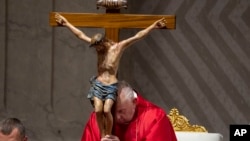The 87-year-old pontiff arrived to preside over the Easter Vigil at Saint Peter's basilica in front of thousands of pilgrims from around the world shortly before 7:30 pm (1830 GMT).
A day after having cancelled his appearance at the Stations of the Cross ceremony Pope Francis, clad in white, arrived in a wheelchair shortly before the two-hour service.
The Vatican had earlier in the day confirmed he would attend.
After the rite of light in a basilica plunged into darkness to symbolise the passage from death to life of Christs, Francis was to deliver the homily and then baptise eight adults.
On Easter Sunday, the pontiff will hold a mass and his "Urbi et Orbi" blessing that is transmitted around the globe.
In a brief statement Friday, the Vatican had said that "to preserve his health ahead of tomorrow's vigil and the Easter Sunday mass, Pope Francis will this evening follow the Way of the Cross at the Colosseum from the Santa Marta Residence," where he lives.
The sudden decision — the Pope's wheelchair was already in place for the procession — and the lack of detail in the statement has added to doubts about his health, and questions as to how long he can continue to lead the Church and its 1.3 billion followers.
Growing doubts
"The Via Crucis of a Fragile Pope," was the Saturday headline in La Stampa, while Il Messaggero spoke of a "renunciation of Francis."
A Vatican source Friday told AFP there was "no particular concern" about his health, and that the decision to pull out had been "simply a measure of caution."
The Argentinian Jesuit also cancelled his participation in the "Via Crucis" in 2023, but that followed a three-day stay in hospital for bronchitis and was announced well ahead of time. Weeks later, he underwent a hernia operation.
Up until Friday, the Pope had attended his various Holy Week engagements, but he has recently appeared tired and has sometimes delegated speaking roles to colleagues.
In December, he cancelled a much-anticipated attendance at the COP28 summit in Dubai.
Francis has previously left the door open to stepping down if he can no longer do the job. That would follow the example of his immediate predecessor, Benedict XVI, who in 2013 became the first pope since the Middle Ages to voluntarily step aside.
But in a memoir published this month, Francis wrote that he did "not have any cause serious enough to make me think of resigning."
Resignation is a "distant possibility" that would be justified only in the event of "a serious physical impediment," he wrote.














Forum